- Home
- Ian Fleming
Dr. No (James Bond - Extended Series Book 6) Page 2
Dr. No (James Bond - Extended Series Book 6) Read online
Page 2
‘WWW calling WXN…. WWW calling WXN…. Can you hear me? … can you hear me?’ London was coming over strong, searching for the Jamaica station.
The footsteps were at the door.
Coolly, confidently, she tapped back: ‘Hear you loud and clear…. Hear you loud and clear…. Hear you …’
Behind her there was an explosion. Something hit her on the ankle. She looked down. It was the lock of the door.
Mary Trueblood swivelled sharply on her chair. A man stood in the doorway. It wasn’t Strangways. It was a big negro with yellowish skin and slanting eyes. There was a gun in his hand. It ended in a thick black cylinder.
Mary Trueblood opened her mouth to scream.
The man smiled broadly. Slowly, lovingly, he lifted the gun and shot her three times in and around the left breast.
The girl slumped sideways off her chair. The earphones slipped off her golden hair on to the floor. For perhaps a second the tiny chirrup of London sounded out into the room. Then it stopped. The buzzer at the Controller’s desk in Radio Security had signalled that something was wrong on WXN.
The killer walked out of the door. He came back carrying a box with a coloured label on it that said PRESTO FIRE, and a big sugar-sack marked TATE & LYLE. He put the box down on the floor and went to the body and roughly forced the sack over the head and down to the ankles. The feet stuck out. He bent them and crammed them in. He dragged the bulky sack out into the hall and came back. In the corner of the room the safe stood open, as he had been told it would, and the cipher books had been taken out and laid on the desk ready for work on the London signals. The man threw these and all the papers in the safe into the centre of the room. He tore down the curtains and added them to the pile. He topped it up with a couple of chairs. He opened the box of Presto firelighters and took out a handful and tucked them into the pile and lit them. Then he went out into the hall and lit similar bonfires in appropriate places. The tinder-dry furniture caught quickly and the flames began to lick up the panelling. The man went to the front door and opened it. Through the hibiscus hedge he could see the glint of the hearse. There was no noise except the zing of crickets and the soft tick-over of the car’s engine. Up and down the road there was no other sign of life. The man went back into the smoke-filled hall and easily shouldered the sack and came out again, leaving the door open to make a draught. He walked swiftly down the path to the road. The back doors of the hearse were open. He handed in the sack and watched the two men force it into the coffin on top of Strangways’s body. Then he climbed in and shut the doors and sat down and put on his top hat.
As the first flames showed in the upper windows of the bungalow, the hearse moved quietly from the sidewalk and went on its way up towards the Mona Reservoir. There the weighted coffin would slip down into its fifty-fathom grave and, in just forty-five minutes, the personnel and records of the Caribbean station of the Secret Service would have been utterly destroyed.
2 ....... CHOICE OF WEAPONS
THREE WEEKS later, in London, March came in like a rattlesnake.
From first light on March 1st, hail and icy sleet, with a Force 8 gale behind them, lashed at the city and went on lashing as the people streamed miserably to work, their legs whipped by the wet hems of their macintoshes and their faces blotching with the cold.
It was a filthy day and everybody said so – even M., who rarely admitted the existence of weather even in its extreme forms. When the old black Silver Wraith Rolls with the nondescript number-plate stopped outside the tall building in Regent’s Park and he climbed stiffly out on to the pavement, hail hit him in the face like a whiff of small-shot. Instead of hurrying inside the building, he walked deliberately round the car to the window beside the chauffeur.
‘Won’t be needing the car again today, Smith. Take it away and go home. I’ll use the tube this evening. No weather for driving a car. Worse than one of those PQ convoys.’
Ex-Leading Stoker Smith grinned gratefully. ‘Aye-aye, sir. And thanks.’ He watched the elderly erect figure walk round the bonnet of the Rolls and across the pavement and into the building. Just like the old boy. He’d always see the men right first. Smith clicked the gear lever into first and moved off, peering forward through the streaming windscreen. They didn’t come like that any more.
M. went up in the lift to the eighth floor and along the thick-carpeted corridor to his office. He shut the door behind him, took off his overcoat and scarf and hung them behind the door. He took out a large blue silk bandanna handkerchief and brusquely wiped it over his face. It was odd, but he wouldn’t have done this in front of the porters or the liftman. He went over to his desk and sat down and bent towards the intercom. He pressed a switch. ‘I’m in, Miss Moneypenny. The signals, please, and anything else you’ve got. Then get me Sir James Molony. He’ll be doing his rounds at St Mary’s about now. Tell the Chief of Staff I’ll see 007 in half an hour. And let me have the Strangways file.’ M. waited for the metallic ‘Yes, sir’ and released the switch.
He sat back and reached for his pipe and began filling it thoughtfully. He didn’t look up when his secretary came in with the stack of papers and he even ignored the half dozen pink Most Immediates on top of the signal file. If they had been vital he would have been called during the night.
A yellow light winked on the intercom. M. picked up the black telephone from the row of four. ‘That you, Sir James? Have you got five minutes?’
‘Six, for you.’ At the other end of the line the famous neurologist chuckled. ‘Want me to certify one of Her Majesty’s Ministers?’
‘Not today.’ M. frowned irritably. The old Navy had respected governments. ‘It’s about that man of mine you’ve been handling. We won’t bother about the name. This is an open line. I gather you let him out yesterday. Is he fit for duty?’
There was a pause on the other end. Now the voice was professional, judicious. ‘Physically he’s as fit as a fiddle. Leg’s healed up. Shouldn’t be any after-effects. Yes, he’s all right.’ There was another pause. ‘Just one thing, M. There’s a lot of tension there, you know. You work these men of yours pretty hard. Can you give him something easy to start with? From what you’ve told me he’s been having a tough time for some years now.’
M. said gruffly, ‘That’s what he’s paid for. It’ll soon show if he’s not up to the work. Won’t be the first one that’s cracked. From what you say, he sounds in perfectly good shape. It isn’t as if he’d really been damaged like some of the patients I’ve sent you – men who’ve been properly put through the mangle.’
‘Of course, if you put it like that. But pain’s an odd thing. We know very little about it. You can’t measure it – the difference in suffering between a woman having a baby and a man having a renal colic. And, thank God, the body seems to forget fairly quickly. But this man of yours has been in real pain, M. Don’t think that just because nothing’s been broken …’
‘Quite, quite.’ Bond had made a mistake and he had suffered for it. In any case M. didn’t like being lectured, even by one of the most famous doctors in the world, on how he should handle his agents. There had been a note of criticism in Sir James Molony’s voice. M. said abruptly, ‘Ever hear of a man called Steincrohn – Dr Peter Steincrohn?’
‘No, who’s he?’
‘American doctor. Written a book my Washington people sent over for our library. This man talks about how much punishment the human body can put up with. Gives a list of the bits of the body an average man can do without. Matter of fact, I copied it out for future reference. Care to hear the list?’ M. dug into his coat pocket and put some letters and scraps of paper on the desk in front of him. With his left hand he selected a piece of paper and unfolded it. He wasn’t put out by the silence on the other end of the line, ‘Hullo, Sir James! Well, here they are: “Gall bladder, spleen, tonsils, appendix, one of his two kidneys, one of his two lungs, two of his four or five quarts of blood, two-fifths of his liver, most of his stomach, four of his twenty-three feet of
intestines and half of his brain.” ’ M. paused. When the silence continued at the other end, he said, ‘Any comments, Sir James?’
There was a reluctant grunt at the other end of the telephone. ‘I wonder he didn’t add an arm and a leg, or all of them. I don’t see quite what you’re trying to prove.’
M. gave a curt laugh. ‘I’m not trying to prove anything, Sir James. It just struck me as an interesting list. All I’m trying to say is that my man seems to have got off pretty lightly compared with that sort of punishment. But,’ M. relented, ‘don’t let’s argue about it.’ He said in a milder voice, ‘As a matter of fact I did have it in mind to let him have a bit of a breather. Something’s come up in Jamaica.’ M. glanced at the streaming windows. ‘It’ll be more of a rest cure than anything. Two of my people, a man and a girl, have gone off together. Or that’s what it looks like. Our friend can have a spell at being an inquiry agent – in the sunshine too. How’s that?’
‘Just the ticket. I wouldn’t mind the job myself on a day like this.’ But Sir James Molony was determined to get his message through. He persisted mildly. ‘Don’t think I wanted to interfere, M., but there are limits to a man’s courage. I know you have to treat these men as if they were expendable, but presumably you don’t want them to crack at the wrong moment. This one I’ve had here is tough. I’d say you’ll get plenty more work out of him. But you know what Moran has to say about courage in that book of his.’
‘Don’t recall.’
‘He says that courage is a capital sum reduced by expenditure. I agree with him. All I’m trying to say is that this particular man seems to have been spending pretty hard since before the war. I wouldn’t say he’s overdrawn – not yet, but there are limits.’
‘Just so.’ M. decided that was quite enough of that. Nowadays, softness was everywhere. ‘That’s why I’m sending him abroad. Holiday in Jamaica. Don’t worry, Sir James. I’ll take care of him. By the way, did you ever discover what the stuff was that Russian woman put into him?’
‘Got the answer yesterday.’ Sir James Molony also was glad the subject had been changed. The old man was as raw as the weather. Was there any chance that he had got his message across into what he described to himself as M.’s thick skull? ‘Taken us three months. It was a bright chap at the School of Tropical Medicine who came up with it. The drug was fugu poison. The Japanese use it for committing suicide. It comes from the sex organs of the Japanese globe-fish. Trust the Russians to use something no one’s ever heard of. They might just as well have used curare. It has much the same effect – paralysis of the central nervous system. Fugu’s scientific name is Tetrodotoxin. It’s terrible stuff and very quick. One shot of it like your man got and in a matter of seconds the motor and respiratory muscles are paralysed. At first the chap sees double and then he can’t keep his eyes open. Next he can’t swallow. His head falls and he can’t raise it. Dies of respiratory paralysis.’
‘Lucky he got away with it.’
‘Miracle. Thanks entirely to that Frenchman who was with him. Got your man on the floor and gave him artificial respiration as if he was drowning. Somehow kept his lungs going until the doctor came. Luckily the doctor had worked in South America. Diagnosed curare and treated him accordingly. But it was a chance in a million. By the same token, what happened to the Russian woman?’
M. said shortly, ‘Oh, she died. Well, many thanks, Sir James. And don’t worry about your patient. I’ll see he has an easy time of it. Goodbye.’
M. hung up. His face was cold and blank. He pulled over the signal file and went quickly through it. On some of the signals he scribbled a comment. Occasionally he made a brief telephone call to one of the Sections. When he had finished he tossed the pile into his Out basket and reached for his pipe and the tobacco jar made out of the base of a fourteen-pounder shell. Nothing remained in front of him except a buff folder marked with the Top Secret red star. Across the centre of the folder was written in block capitals: CARIBBEAN STATION, and underneath, in italics, Strangways and Trueblood.
A light winked on the intercom. M. pressed down the switch. ‘Yes?’
‘007’s here, sir.’
‘Send him in. And tell the Armourer to come up in five minutes.’
M. sat back. He put his pipe in his mouth and set a match to it. Through the smoke he watched the door to his secretary’s office. His eyes were very bright and watchful.
James Bond came through the door and shut it behind him. He walked over to the chair across the desk from M. and sat down.
‘Morning, 007.’
‘Good morning, sir.’
There was silence in the room except for the rasping of M.’s pipe. It seemed to be taking a lot of matches to get it going. In the background the fingernails of the sleet slashed against the two broad windows.
It was all just as Bond had remembered it through the months of being shunted from hospital to hospital, the weeks of dreary convalescence, the hard work of getting his body back into shape. To him this represented stepping back into life. Sitting here in this room opposite M. was the symbol of normality he had longed for. He looked across through the smoke clouds into the shrewd grey eyes. They were watching him. What was coming? A post-mortem on the shambles which had been his last case? A curt relegation to one of the home sections for a spell of desk work? Or some splendid new assignment M. had been keeping on ice while waiting for Bond to get back to duty?
M. threw the box of matches down on the red leather desk. He leant back and clasped his hands behind his head.
‘How do you feel? Glad to be back?’
‘Very glad, sir. And I feel fine.’
‘Any final thoughts about your last case? Haven’t bothered you with it till you got well. You heard I ordered an inquiry. I believe the Chief of Staff took some evidence from you. Anything to add?’
M.’s voice was businesslike, cold. Bond didn’t like it. Something unpleasant was coming. He said, ‘No, sir. It was a mess. I blame myself for letting that woman get me. Shouldn’t have happened.’
M. took his hands from behind his neck and slowly leant forward and placed them flat on the desk in front of him. His eyes were hard. ‘Just so.’ The voice was velvet, dangerous. ‘Your gun got stuck, if I recall. This Beretta of yours with the silencer. Something wrong there, 007. Can’t afford that sort of mistake if you’re to carry an 00 number. Would you prefer to drop it and go back to normal duties?’
Bond stiffened. His eyes looked resentfully into M.’s. The licence to kill for the Secret Service, the double-0 prefix, was a great honour. It had been earned hardly. It brought Bond the only assignments he enjoyed, the dangerous ones. ‘No, I wouldn’t, sir.’
‘Then we’ll have to change your equipment. That was one of the findings of the Court of Inquiry. I agree with it. D’you understand?’
Bond said obstinately, ‘I’m used to that gun, sir. I like working with it. What happened could have happened to anyone. With any kind of gun.’
‘I don’t agree. Nor did the Court of Inquiry. So that’s final. The only question is what you’re to use instead.’ M. bent forward to the intercom. ‘Is the Armourer there? Send him in.’
M. sat back. ‘You may not know it, 007, but Major Boothroyd’s the greatest small-arms expert in the world. He wouldn’t be here if he wasn’t. We’ll hear what he has to say.’
The door opened. A short slim man with sandy hair came in and walked over to the desk and stood beside Bond’s chair. Bond looked up into his face. He hadn’t often seen the man before, but he remembered the very wide apart clear grey eyes that never seemed to flicker. With a non-committal glance down at Bond, the man stood relaxed, looking across at M. He said ‘Good morning, sir,’ in a flat, unemotional voice.
‘Morning, Armourer. Now I want to ask you some questions.’ M.’s voice was casual. ‘First of all, what do you think of the Beretta, the .25?’
‘Ladies’ gun, sir.’
M. raised ironic eyebrows at Bond. Bond smiled thinly.
> ‘Really! And why do you say that?’
‘No stopping power, sir. But it’s easy to operate. A bit fancy looking too, if you know what I mean, sir. Appeals to the ladies.’
‘How would it be with a silencer?’
‘Still less stopping power, sir. And I don’t like silencers. They’re heavy and get stuck in your clothing when you’re in a hurry. I wouldn’t recommend anyone to try a combination like that, sir. Not if they were meaning business.’
M. said pleasantly to Bond, ‘Any comment, 007?’
Bond shrugged his shoulders. ‘I don’t agree. I’ve used the .25 Beretta for fifteen years. Never had a stoppage and I haven’t missed with it yet. Not a bad record for a gun. It just happens that I’m used to it and I can point it straight. I’ve used bigger guns when I’ve had to – the .45 Colt with the long barrel, for instance. But for close-up work and concealment I like the Beretta.’ Bond paused. He felt he should give way somewhere. ‘I’d agree about the silencer, sir. They’re a nuisance. But sometimes you have to use them.’
‘We’ve seen what happens when you do,’ said M. drily. ‘And as for changing your gun, it’s only a question of practice. You’ll soon get the feel of a new one.’ M. allowed a trace of sympathy to enter his voice. ‘Sorry, 007. But I’ve decided. Just stand up a moment. I want the Armourer to get a look at your build.’
Bond stood up and faced the other man. There was no warmth in the two pairs of eyes. Bond’s showed irritation. Major Boothroyd’s were indifferent, clinical. He walked round Bond. He said ‘Excuse me’ and felt Bond’s biceps and forearms. He came back in front of him and said, ‘Might I see your gun?’
Bond’s hand went slowly into his coat. He handed over the taped Beretta with the sawn barrel. Boothroyd examined the gun and weighed it in his hand. He put it down on the desk. ‘And your holster?’

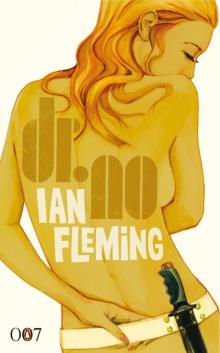 Doctor No
Doctor No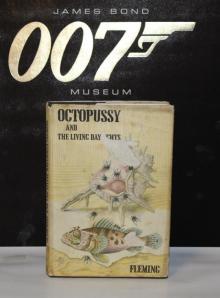 Octopussy & the Living Daylights
Octopussy & the Living Daylights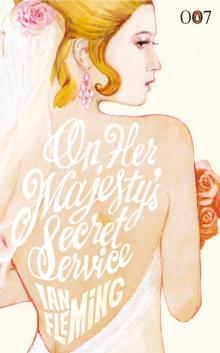 On Her Majestys Secret Service
On Her Majestys Secret Service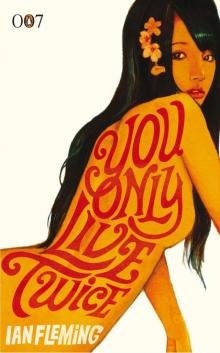 You Only Live Twice
You Only Live Twice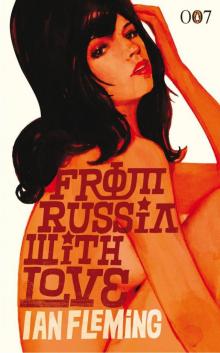 From Russia With Love
From Russia With Love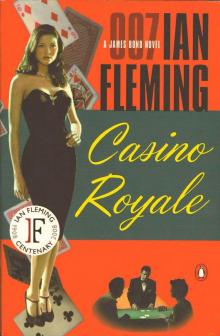 Casino Royale
Casino Royale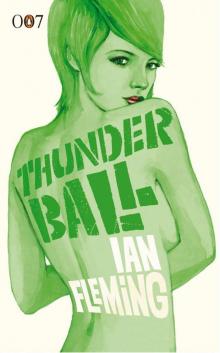 Thunderball
Thunderball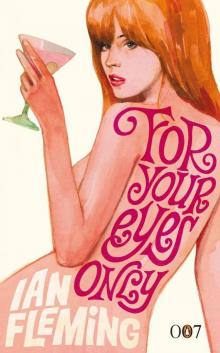 For Your Eyes Only
For Your Eyes Only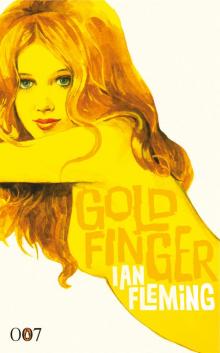 Goldfinger
Goldfinger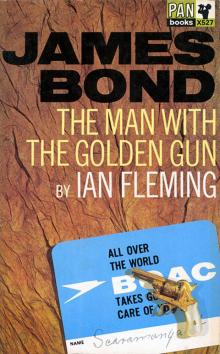 The Man With the Golden Gun
The Man With the Golden Gun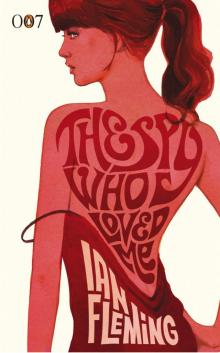 The Spy Who Loved Me
The Spy Who Loved Me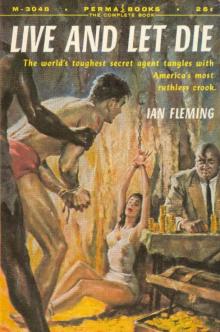 Live and Let Die
Live and Let Die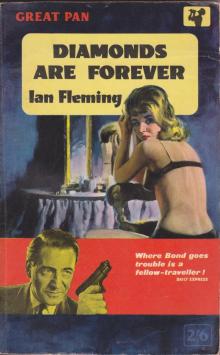 Diamonds Are Forever
Diamonds Are Forever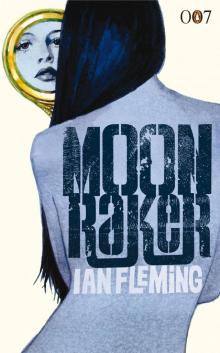 Moonraker
Moonraker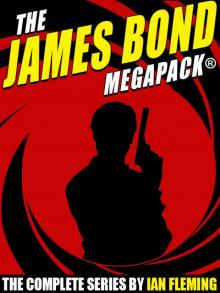 The James Bond MEGAPACK®
The James Bond MEGAPACK®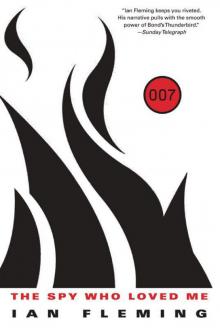 Bond 10 - The Spy Who Loved Me
Bond 10 - The Spy Who Loved Me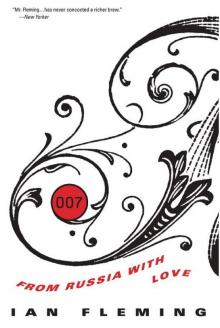 From Russia with Love (James Bond - Extended Series Book 5)
From Russia with Love (James Bond - Extended Series Book 5)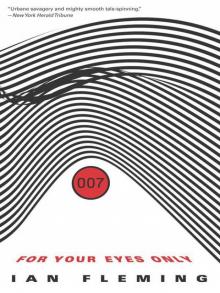 Bond 08 - For Your Eyes Only
Bond 08 - For Your Eyes Only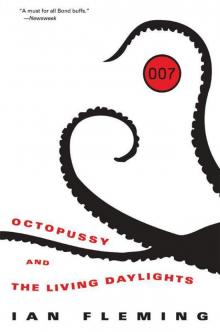 Bond 14 - Octopussy and the Living Daylights
Bond 14 - Octopussy and the Living Daylights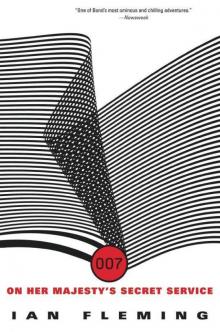 Bond 11 - On Her Majesty's Secret Service
Bond 11 - On Her Majesty's Secret Service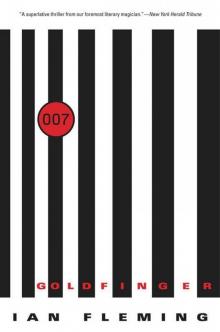 Bond 07 - Goldfinger
Bond 07 - Goldfinger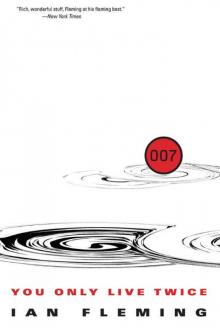 Bond 12 - You Only Live Twice
Bond 12 - You Only Live Twice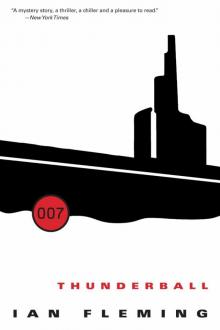 Bond 09 - Thunderball
Bond 09 - Thunderball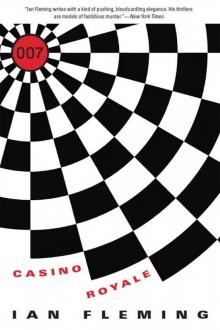 Bond 01 - Casino Royale
Bond 01 - Casino Royale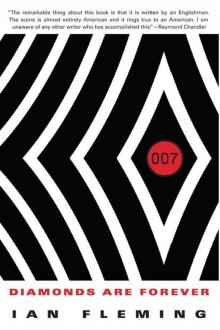 Diamonds are Forever (James Bond - Extended Series Book 4)
Diamonds are Forever (James Bond - Extended Series Book 4)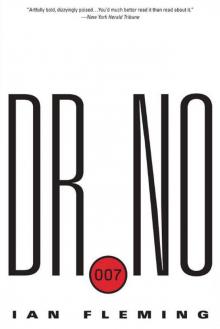 Bond 06 - Dr. No
Bond 06 - Dr. No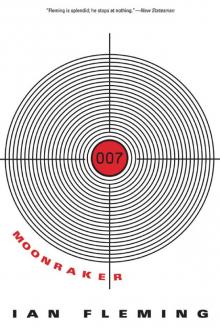 Moonraker (James Bond - Extended Series Book 3)
Moonraker (James Bond - Extended Series Book 3)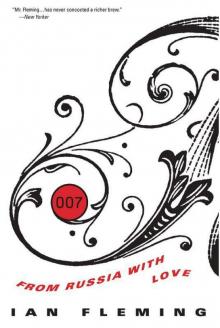 Bond 05 - From Russia With Love
Bond 05 - From Russia With Love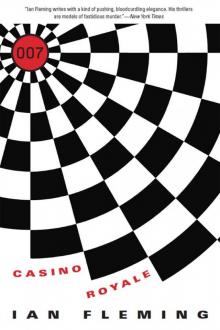 Casino Royale (James Bond - Extended Series Book 1)
Casino Royale (James Bond - Extended Series Book 1)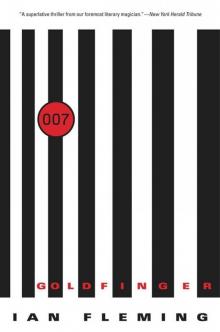 Goldfinger (James Bond - Extended Series Book 7)
Goldfinger (James Bond - Extended Series Book 7)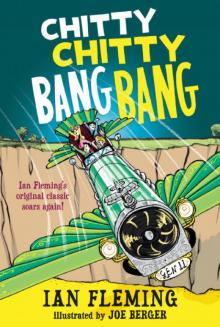 Chitty Chitty Bang Bang: The Magical Car
Chitty Chitty Bang Bang: The Magical Car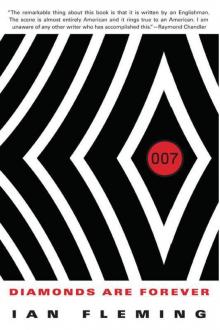 Bond 04 - Diamonds Are Forever
Bond 04 - Diamonds Are Forever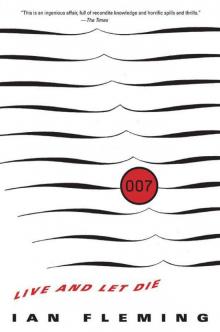 Bond 02 - Live and Let Die
Bond 02 - Live and Let Die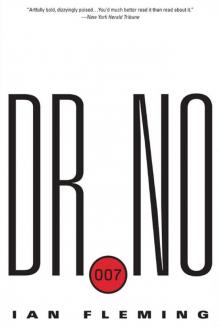 Dr. No (James Bond - Extended Series Book 6)
Dr. No (James Bond - Extended Series Book 6) The Hildebrandt rarity
The Hildebrandt rarity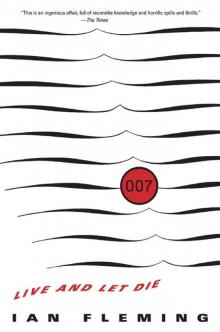 Live and Let Die (James Bond - Extended Series Book 2)
Live and Let Die (James Bond - Extended Series Book 2)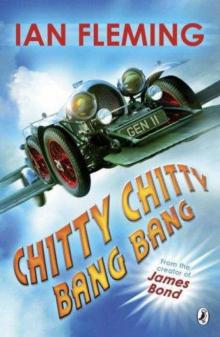 Chitty Chitty Bang Bang
Chitty Chitty Bang Bang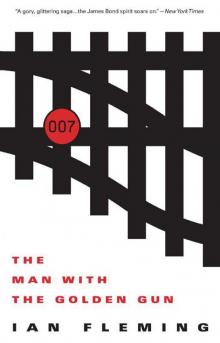 Bond 13 - The Man With the Golden Gun
Bond 13 - The Man With the Golden Gun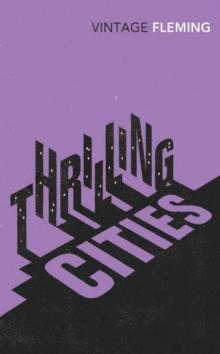 Thrilling Cities
Thrilling Cities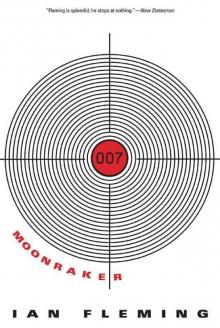 Bond 03 - Moonraker
Bond 03 - Moonraker